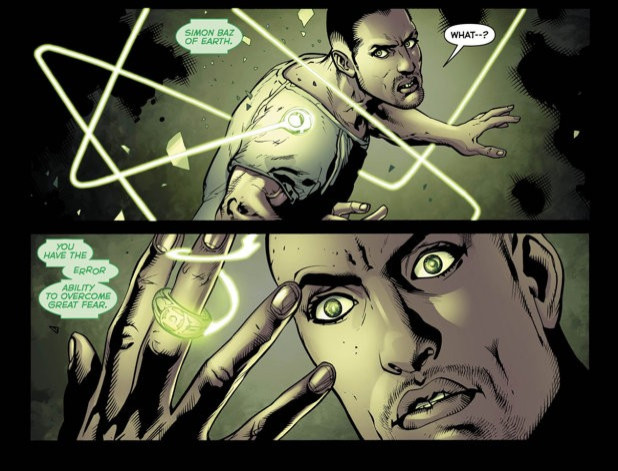DC Unveils First Muslim-American Superhero, Simon Baz, The New Green Lantern

The latest Green Lantern to take the oath of the Green Lantern Corp. also happens to be the first Muslim-American superhero. The power of the Green Lantern comes from a ring forged with the power of will. When a member of the Green Lantern Corp. dies, the ring seeks out a worthy replacement. In this case, that worthy replacement may be one of DC's most controversial moves to date.
"Green Lantern" writer Geoff Johns stated via CBS News "I thought a lot about it - I thought back to what was familiar to me," he then added, "this is such a personal story." Dearborn-native Simon Baz is given the mantle of Green Lantern in issue #0 of DC's latest relaunch series dubbed "The New 52." Baz, like many in Michigan, goes through economic turmoil and is laid off from his job at an automotive facility. The story begins much earlier, though, with a young Lantern-to-be watching the 9/11 terror attacks on the World Trade Center with his family.
DC will look to add in the racial tensions felt in the immediate aftermath of 9/11, with many Arab-Americans being regarded as mistrustful or unfairly labeled "terrorists" by co-workers and neighbors. "Obviously, it's affecting everybody," Johns said, adding, "one of the things I really wanted to show was its effect on Simon and his family in a very negative way."
Muslim-American tensions have been discussed in comic form before, notoriously with Frank Miller's "Holy Terror," a book about a character named The Fixer who engages in bloody vengeance with a group of Islamic extremists for attacking the fictional "Empire City," a thinly-veiled version of New York. Miller initially approached the story as a Batman story for DC, with the Caped Crusader protecting Gotham City from Al-Qaeda. The book was accused of anti-Islamic propaganda by Wired.
The Daily Mail states that Johns wanted to create a controversial character, "he's not a perfect character. He's obviously made some mistakes in his life, but that makes him more compelling and relatable, hopefully (it's) a compelling character regardless of culture or ethnic background. ... But I think it's great to have an Arab-American superhero. This was opportunity and a chance to really go for it."
DC also made the controversial move of making an alternate-universe Green Lantern gay this past June. The Daily Beast interviewed James Robinson, writer of DC's "Earth Two" series, "one of the things that comic-book writers want to do is inject as much realism as possible into their comics," he then added, "obviously, we have gay people in life, so we have gay people in comics."
Robinson then told MSN, "What I really want to do ... is make the fact that he's gay to be a part of who he is and not to be the one identifying aspect of him."
Johns is hoping for the same in that by making Green Lantern Muslim, it doesn't become the defining characteristic of the character, 'it doesn't completely define the character but it shapes the character," he said. "My biggest hope is that people embrace it and understand what we're trying to do."
© Copyright IBTimes 2025. All rights reserved.





















